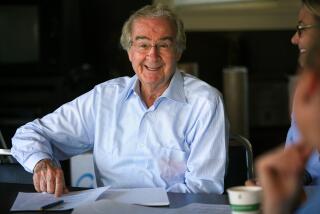Joseph Gallo Loses E&J; Winery Suit : Ernest and Julio Did Not Defraud Brother, Court Rules
- Share via
A federal judge in Fresno ruled that Ernest and Julio Gallo will not have to give their younger brother a one-third interest in their enormously successful winery--the world’s largest. But the judge also set for trial the winery’s contention that Joseph Gallo’s use of his name on cheese infringes the “Gallo” trademark.
U.S. District Court Judge Edward Dean Price on Tuesday set a Nov. 15 trial date on the trademark infringement issue. Price also dismissed Joseph Gallo’s counterclaim that, as a child, he was fraudulently denied a one-third interest in the business that became the E & J Gallo winery after the death of the brothers’ parents 55 years ago.
From the moment of the filing in 1986, Ernest and Julio Gallo’s trademark lawsuit and Joseph Gallo’s countersuit stirred broad public interest--partly because so little is known about the locally active but otherwise publicity-shy brothers. What is known is that their winery, based in Modesto, sold 70 million cases of wine last year, making it the world’s largest. Industry sources estimate annual sales at about $1 billion.
So far, the litigation has generated 19 volumes of testimony and legal arguments. Among other things, these offer the public the most detailed history yet to emerge of the Gallos since their father, Joseph Gallo Sr., arrived in California from Italy early in this century.
No Ownership Sought
In dismissing Joseph Gallo Jr.’s claim for an interest in the winery, however, Price characterized much of this evidence as anecdotal. The judge said he found no legal basis for the claim or for proving that Ernest Gallo, as Joseph’s guardian after their parents’ deaths until he reached adulthood in 1941, had concealed part of the estate that later became the winery.
Price said his review of probate documents indicated that Ernest and Julio Gallo had borrowed Joseph’s $11,255.25 share of the parents’ estate for use in the older brothers’ E & J Gallo Winery. This money was eventually repaid with interest, the judge noted. Later, after Joseph had filed a complaint in probate court, the older brothers were ordered to pay an additional $20,000 to Joseph as his share of winery earnings attributable to their “co-mingled” use of his funds.
The judge noted that Joseph Gallo had not sought an ownership interest in the winery at that time.
Price said he concluded from reviewing probate records “that Ernest’s administration was appropriate and that all of the assets of the estate were reported and administered.” These were divided at the time into three equal parts, one for each brother.
The trademark-infringement case goes back to April, 1986, when E & J Winery complained that the use of “Joseph Gallo” as a consumer trademark for a brand of cheese he and his son and partner Michael make and market infringes upon the older brothers’ registered trademarks. These include use of the words “Gallo” and “Ernest and Julio,” and their use on wine, prepared meat products and cheese.
Price said the evidence so far submitted failed to settle a number of legal points. These include whether the use of “Joseph Gallo” on cheese confuses consumers. The winery cited a case of fatal cheese contamination stemming from a Southland plant, and contended that similar negative publicity regarding “Joseph Gallo” brand cheese might harm sales of the older brothers’ wines.
“There is much law to be explored on this subject, and many more facts to be marshalled by both sides,” the judge said.
Joseph Gallo’s attorney, Denis T. Rice said in an interview that he may appeal Price’s dismissal since some of the points raised on the ownership issue also bear on the trademark case. “That’s a valid option that we are looking at,” he said.
As for the trademark issue, Rice said: “We believe the winery has no basis to stop him from using his own name.”
Winery spokesman Dan Solomon said dismissal of Joseph Gallo’s claim for an equal share in the wine business was expected. “It was always our belief that, once the facts were known, this ludicrous and false claim would be thrown out of court.”
More to Read
Inside the business of entertainment
The Wide Shot brings you news, analysis and insights on everything from streaming wars to production — and what it all means for the future.
You may occasionally receive promotional content from the Los Angeles Times.










